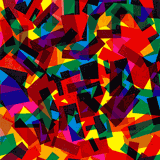
J’envoie
J’envoie / La vitesse des chats sauvages EP
(Sulpont / Self-released; 2008 / 2010)
By Conrad Amenta | 13 February 2010
Like twin antagonists that knowingly play on our expectations, J’envoie’s two EPs seem almost satirical in their play at binaries. Or rather they are the deliberate roughening of an already very deliberate musicianship; who really knows? The enigmatic talent of J’envoie sort of flits in and out of sight, a band in peripatetic transit. So uncertain was their status—the rumors of their impending breakup and return and so on—that I essentially sat on their great debut EP while waiting for news, that news now arriving in the form of the band’s nigh equal follow up. Their future is no less murky, but the content still speaks for itself: one of the city’s best bands, and certainly one of the most accomplished and effortlessly writerly, still points to a burgeoning scene no longer dependent on a staidly rock/folk dichotomy. J’envoie’s music may not locate itself so directly between those two poles, but it’s of the between spaces, of fluidity and dynamism and, one hopes, is prescient.
So much of the still instantly accessible and seemingly renewable self-titled EP is provided new context by La vitesse des chats sauvages (hereafter des chats), which intentionally muddies up the band’s once pristine instrumental façade and groove-heavy jazz debts. The five-part “Topographies” still chugs along with undeniable momentum and flawlessly executed vision, but in light of “Caserne centrale” and its thudding, double-fisted intro and wheeling, dizzy verses, is re-cast as polished precedent to the band’s less refined qualities. And while nothing on des chats quite reaches the understated beauty and tailored perfection of “Emmanuelle,” the EP is more confident in its entirety: des chats is full of dissonant noise gaps, drum breakdowns, percussiveness that verges on the cantankerous, and gaming of the highest order (see again “Caserne centrale,” with its paranoiac interludes). Self-recorded squall, confrontational in places, des chats sets itself up as necessarily antithetical to the band’s elegant debut.
In places des chats‘s songs self-truncate, the kind of editing that in instrumental music like J’envoie’s seems less explicitly an attempt to say something than on overtly lyrical efforts that do the same, like Spoon’s Transference. The editing is here an important part of the same fundamental, guttural motion from which the EP is itself drawn, and speaks to something crucial about the band’s intentions. Where their self-titled debut began with traditional arrangements—influenced by jazz and post-rock though they were—and then expanded outwards, des chats begins a process of deconstruction (or outright combustion) that is indicative of levels of self-analysis generally reserved for more acute songwriters. Difficult to say, then, that one EP is better in some way or another than the other; they sometimes seem interdependent in an essential way, as if their differences follow important intersections.
As in the textural “Rudesse” which, like “Caserne centrale” can sound like a cinematic gambit, soundtracked with intuition and irony and humor, to sound like a stylized anachronism—almost direct contrast to the debut’s unquestioning modernism. Or the asynchronous “Gaëtan Hart,” all sharp angles and rough edges and a lurching edit of a conclusion. Or “Arena,” which allows a guitar solo to wander about in a way that’s difficult to imagine on the debut EP. These types of gestures seem to imply that the debut, with its efficiency of scope and clarity of production, was almost naïve, that des chats chips away at that practiced sheen to the wonderful, authentic crud beneath. While seeming effortless, however, this new EP’s goals seem less obvious and the path to its enjoyment is certainly less direct. It may be more mature, but because it’s so obviously less concerned with appeasing an audience that distinction ends up being complicated. You’ll have to work to get from des chats what the band’s debut readily offers.
None of which is to imply that these two EPs, at once contradictory and complementary, are the result of an immaculately mapped-out plan. Much more appealing to think that each seems like the natural product of J’envoie’s fascinating diversification, that J’envoie just kind of is—the sum of its many excellent and independently developing parts. I’d be happy to receive an EP from them every couple of years, endlessly complicating my conception of the band, rather than insist on some statement of an album, from which bands like this—the really good bands—only naturally run anyway.





